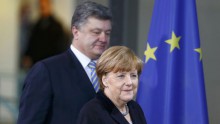Three days after Angela Merkel’s announcement to gradually retire from politics, Germany’s chancellor is visiting Ukraine. The prospect of her withdrawal leaves the future of Kyiv’s relations with Berlin in uncertainty.
“We won’t let you down.” Heiko Maas was eager to deliver a strong message during his visit to Ukraine in June 2018. On his first trip to the war-torn country Germany’s foreign minister attempted to make his own picture of the situation in Eastern Ukraine. Hosted and accompanied by Pavlo Klimkin, his Ukrainian counterpart, Maas travelled to the Donbas region, amongst others. After seeing the deserted village of Shyrokyne, once the site of a fierce standoff between Ukrainian forces and separatists, he emphasized his support for a peaceful solution to the conflict.
Heiko Maas’s priorities regarding Eastern Europe are largely in sync with Kyiv’s agenda. Maas, member of the Social Democrats (SPD), backs a UNO-led mission in Ukraine’s embattled areas. Moreover, he has taken a much tougher stance on Russia, compared to his predecessor Sigmar Gabriel, calling Moscow’s policies “increasingly hostile.”
Upon Angela Merkel’s visit to Ukraine, however, Kyiv’s relations with Berlin remain ambiguous. Despite the ongoing economic sanctions on Russia, introduced by the EU and staunchly supported by Merkel’s government, Germany keeps clinging to its commitment to the gas pipeline project Nord Stream 2.
Furthermore there was anger in Kyiv when in early 2017 Ernst Reichel, German ambassador to Ukraine, suggested there may be elections being held in Donetsk and Lugansk before the complete withdrawal of Russian troops. Asked by “The Day” newspaper, the German foreign ministry, however, clarified Berlin’s stance by declaring any “local elections [in Eastern Ukraine] had to be compatible with Ukrainian law as written down in the Minsk Agreement.”
Since Germany looks highly unlikely to drop its commitment to the Nord Stream 2 project it is doubtful whether Merkel will make new statements on that issue. Economics and trade may nevertheless play a key role during her Kyiv trip. In August Andriy Melnyk, Ukraine’s ambassador to Germany, commended the rising trade relations between the two countries. At the same time, he urged German businesses to increase their investments in Ukraine. “In this regard, Merkel’s visit will be of substantial importance,” Melnyk declared.
The topic of Germany’s historical responsibility for Ukraine – usually an important aspect in Germany’s relations with Poland – is unlikely to play a major role at the Chancellor’s talk with President Petro Poroshenko and Prime Minister Volodymyr Hroysman. In May 2017 the Bundestag, Germany’s parliamentary body, acknowledged the country’s historical responsibility to Ukraine yet failed to formally pass a legislative document. Merkel’s relations with Ukraine’s leaders, however, have not been strained by that.
The shape of Ukraine’s long-term relationship with Germany, however, looks increasingly unclear as on Monday Angela Merkel announced to retire from politics by the end of the current legislative term due in 2021. She likewise declared to step down as party leader later this year.
Annegret Kramp-Karrenbauer, the CDU’s secretary general and Merkel’s long-time ally, is among her possible successors. Jens Spahn, who is currently serving as minister of health and gained a reputation of opposing the Chancellor’s migration policies, has also for a long time been viewed as a top contender.
While both politicians have repeatedly criticized Russia’s foreign policy, Jens Spahn’s stance on Germany’s relations with Ukraine is uncertain.
As Berlin is slowly preparing for Angela Merkel’s departure, her visit to Ukraine on Thursday will presumably be her last.








